Risk governance
Enhancing Resilience
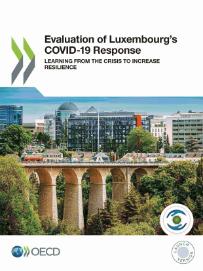 |
Evaluation of Luxembourg's COVID-19 ResponseLearning from the Crisis to Increase ResilienceAs countries seek to learn from the COVID-19 crisis and increase their resilience for the future, evaluations are important tools to understand what worked or not, why and for whom. This report is the first of its kind. It evaluates Luxembourg’s responses to the COVID-19 crisis in terms of risk preparedness, crisis management, as well as public health, education, economic and fiscal, and social and labour market policies. While Luxembourg’s response to the pandemic has been particularly agile, preserving the country’s resilience will require maintaining high levels of trust in government, reducing inequalities, and laying the foundations for inclusive growth. The findings and recommendations of this report will provide guidance to public authorities in these efforts.
Published on 20 October 2022
|
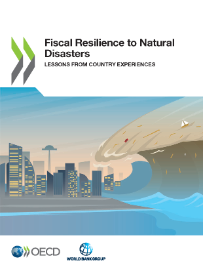 |
Fiscal Resilience to Natural DisastersLessons from Country ExperiencesNatural disasters continue to cause widespread damage and losses, with fast growing economies particularly exposed. Governments often shoulder a significant share of the costs of disaster recovery and reconstruction. This is true in OECD countries and even more so in developing economies, where private insurance markets are not as well developed. The fiscal impact of disasters on a government’s budget can be sizeable. Expenditures for the government arise from both explicit and implicit commitments to compensate for disaster losses. This report presents the results of a study that compares country practices in the management of the financial implications of disasters on government finances for a set of OECD member and partner countries particularly exposed to natural hazards.
Published on 20 May 2019
|
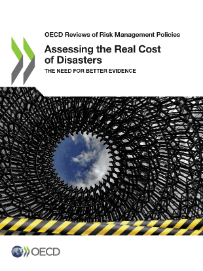 |
Assessing the Real Cost of DisastersThe Need for Better EvidenceDisasters disrupt socio-economic activities and cause substantial damage. Yet, their full economic impact remains largely unknown, especially the cost of smaller disasters and indirect impacts such as those due to business disruptions. Similarly, little information exists on the total amount of public resources that countries devote to disaster risk management. Reliable, comprehensive and comparable data on the economic impact of disasters as well as on public spending on disaster management and risk prevention are essential for developing effective disaster risk management policies. This report provides an overview of countries' efforts to improve the quality and quantity of information on the costs of disasters.
Published on 3 May 2018
|
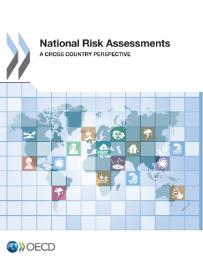 |
National Risk AssessmentsA Cross Country PerspectiveThis report provides a synthetic view of national risk assessments (NRAs) in twenty OECD Member countries. NRA are used to support risk management decisions in a rapidly changing global risk landscape characterized by increasingly complex, interconnected societies and highly mobile people, information and goods. The report highlights good governance practices in establishing NRAs and how the results are used to inform public policy. It identifies challenges that OECD Member countries continue to confront in their efforts to implement NRA, and makes concrete recommendations where improvements could still be made.
Published on 5 March 2018
|
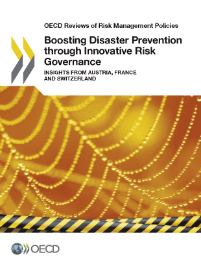 |
Boosting Disaster Prevention through Innovative Risk GovernanceInsights from Austria, France and SwitzerlandIn 2014 the OECD carried out work to take stock of OECD countries' achievements in building resilience to major natural and man-made disasters. The report suggested that albeit significant achievements were made through effective risk prevention and mitigation management, past disasters have revealed persistent vulnerabilities and gaps in risk prevention management across OECD. Based on the findings of this OECD-wide report a cross-country comparative study was undertaken in Austria, France and Switzerland to test the recommendations put forward in specific country contexts. This report summarises the individual and comparative country case study findings. It highlights that the risk prevention policy mix has shifted in favor of organisational measures such as hazard informed land use planning or strengthening the enforcement of risk sensitive regulations. In the meantime, the great need for maintaining the large stock of structural protection measures has been overlooked and vulnerability might increase because of that. The report highlights the need for better policy evaluation to increase the effectiveness of risk prevention measures in the future. The report highlights practices where countries succeeded to make risk prevention a responsibility of the whole of government and the whole of society, by analysing supporting governance and financing arrangements.
Published on 19 December 2017 |
 (1)-203x287.jpg) |
Managing disaster-related contingent liabilities in public finance frameworksNatural disasters have caused, and continue to cause, a significant amount of economic costs. The costs of disasters are often, and to a large extent, shouldered by governments, especially in economies where private insurance markets are not well developed. Governments are asked to provide financing for explicit commitments made prior to a disaster, and are often under pressure to make payments for which no such commitments were made earlier. Ex-post costs to governments take the form of contingent liabilities within national budgeting and government balance sheet frameworks. Disasters can thereby cause both downside risks to government revenue as well as to expenditure. There is little evidence, and hence limited policy advice, on how disaster-related contingent liabilities are managed by governments. This paper sets out to clarify the concept of contingent liabilities and the channels through which they can impact government balance sheets, including fiscal risks. It provides a framework for identifying and quantifying disaster-related contingent liabilities with a view to inform country case studies for comparative policy analysis. Published on 7 June 2017 |
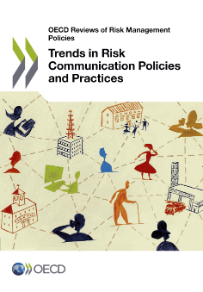 |
Trends in Risk Communication Policies and PracticesGood risk communication is crucial for raising awareness among citizens and business about the risks their countries face. However, many countries have seen their risk communication tools fail in the past, leading to persistently low levels of risk awareness, especially in the absence of recent disasters. This OECD report surveys current trends in risk communication policies and practices across OECD and partner countries. It seeks to understand why risk communication tools have failed and what OECD countries can do to improve the effectiveness of their risk communication policies. Based on an OECD-wide survey, the report evaluates the degree to which countries have used risk communication tools to not only increase risk awareness, but to inform stakeholders about potential preparedness and prevention measures they can take to boost their resilience to future risks.
Published on 20 October 2016 |
-203x292.jpg) |
Boosting Resilience through Innovative Risk GovernanceThis report examines what countries have achieved in terms of strengthening resilience through better risk management and identifies persisting challenges. It focuses on the importance of creating an institutional environment that engages all stakeholders and allows them to build resilience against future shocks. This report has contributed to the development of the OECD Recommendation on the Governance of Critical Risks.
Published on 30 May 2014
|
 (2)-203x287.jpg) |
The Use of Social Media in Risk and Crisis CommunicationThis report highlights the changing landscape of risk and crisis communications and in particular how social media can be a beneficial tool, but also create challenges for crisis managers. It explores different practices of risk and crisis communications experts related to the use of social media and propose a framework for monitoring the development of practices among countries in the use of social media for risk and crisis communications.
Published on 17 December 2013
|
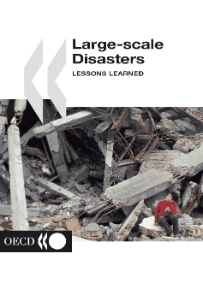 |
Large-scale DisastersLessons LearnedThe September 11th terrorist attacks, the Chernobyl nuclear accident, Hurricane Andrew and the Kobe earthquake are all recent examples of large-scale disasters that have taken a massive toll in human lives, wealth and property. They have disrupted vital systems such as transport and energy supplies and spilled over into neighbouring as well as distant regions. They have also generated widespread anxiety, and in some cases created deep-seated public mistrust of governments' ability to protect their citizens. This book is based on a report prepared between May and July 2003 by a multi-disciplinary team of experts from inside and outside of the OECD. It examines the economic and social impacts of past large-scale disasters, and draws a number of key lessons for the future. Its focus is on better prevention of disasters, and on restoring trust and securing recovery in their aftermath. Published on 16 April 2004 |
Related Documents